Education
Adults with Food Allergies
Back to Category View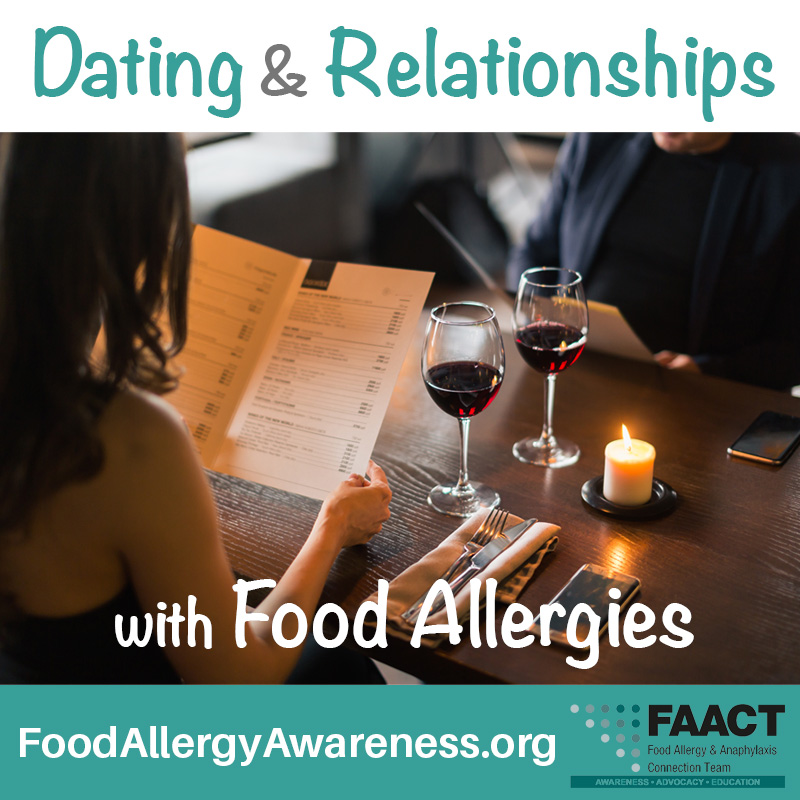
Empowered Adults in the Dating World: Dating with Food Allergies
TEAL Tactics on how to date with food allergies:
- Educate your date about your food allergies within the first few conversations.
- When planning a date, remind your date of your food allergies.
- Choose restaurants that you are familiar and comfortable with dining.
- Know the restaurants food allergy protocol, but always reiterate your food allergies to restaurant staff when placing your order and provide your allergy chef card.
- When on a date, do not share food or drinks unless the safety of both meals and drinks are ensured.
- Ensure the date environment (i.e. movie theater, bowling alley, baseball game) is safe.
- Always be prepared to clean surfaces and hands with proper wipes to ensure allergen is not present.
- Dates include handholding and kissing. Remind your date not to consume your allergen(s) prior to your date. If he/she does, waiting one hour allows 99% of allergen to be eliminated (see attached reference). You may also consider rinsing of mouth and/or brushing teeth.
- Sending gentle reminders to your date about your allergens is important to ensure your safety.
- Discuss your Allergy & Anaphylaxis Emergency Plan with your date before the date occurs.
- Make sure he/she knows where to locate your epinephrine auto-injectors.
- Make sure he/she knows what the signs and symptoms are for anaphylaxis.
- Before a date, share a video on how to use an epinephrine auto-injector in case you have an allergic reaction – this is important to share when first starting to date someone.
- If your date orders food that contains your allergen while with you, consider this person may not be the right person for you!
TEAL Tactics to manage your food allergies in a relationship:
- Continuous communication and education are key to ensure your safety!
- Ensure your partner continues to take your food allergies seriously.
- Ensure communication of your food allergy when attending family gatherings and find out what’s on the menu.
- Review all labels for foods prepared, if there is no label, do not consume it.
- Your partner is your best advocate, other than yourself!
- Bring a food option when attending family gatherings.
- Frequent cleaning of common spaces/items is necessary to avoid a contact allergic reaction (i.e. couch crumbs, remote control).
- Continue educating on the use of epinephrine auto-injectors, and practice with a trainer regularly.
- Grocery shopping, cooking, reading labels, etc. together and regularly will help your partner understand how to manage food allergies.
- For safety, your partner should avoid your allergen, if they choose to consume your allergen, ensure that it is done safely.
- A tactic for this is to make sure that they consume your allergen in a space other than your shared space or if it is in your shared space, to ensure that the space is properly cleaned afterwards to avoid cross-contact.
- If traveling apart and your allergen is consumed, make sure that your partner’s toothbrush is changed before returning home (i.e. nut oils remain on toothbrush).
- Ensure your partner knows your dining food allergy protocol when ordering food.
- When kissing in a relationship, wait the appropriate time before kissing if your allergen is consumed. Remind your partner not to consume your allergen(s) prior to being together. If he/she does, waiting one hour allows 99% of allergen to be eliminated (see attached reference). Another consideration is rinsing of mouth and/or brushing teeth.
- Having a food allergy in a relationship can be fun - you can explore new recipes and new restaurants with your partner!
Download FAACT's Dating with Food Allergies.
Food allergies affect as many as 32 million Americans, including 26 million adults.
Be “Empowered” with these TEAL Tactics on how to start and maintain the discussion of food allergies in the dating world!
Follow FAACT Adults with Food Allergies Facebook Page
Click here to learn more about managing food allergies as an adult.
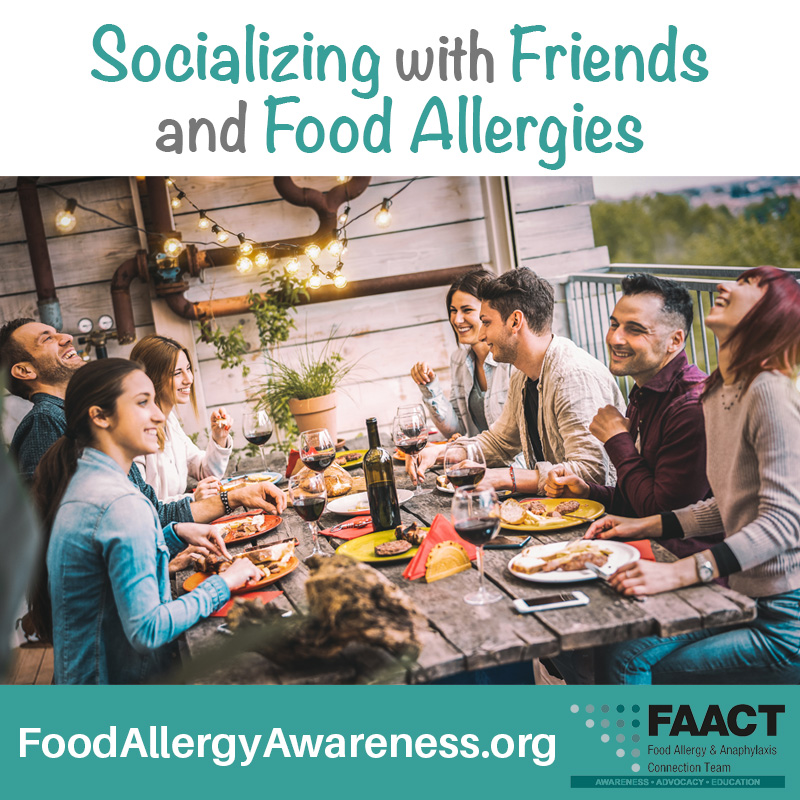
Socializing with Friends and Food Allergies
We hear this line when we are kids, and we hear it when we are adults. Somehow between childhood and adulthood, people still don’t understand that food allergy severity has a very wide range. Often times, people confuse food intolerances and food allergies, and then cross-contact is the farthest thing from being understood.
The holidays are a wonderful time of year. There are more than enough social gatherings to attend and food is usually the star of the event. A traditional cookie swap could be a nightmare, especially when someone says “well, I have a food allergy, too.” and claims that the cookies will be safe! It is hard as an adult to show a lack of trust in a close friend or family member, but remember your health and safety should always come first; even if it means asking uncomfortable questions one too many times.
When invited to an event, still take the same amount of caution and protocol to ensure your safety.
Pre-Party Checklist:
- Speak with the host and ask what he/she is serving. Consider asking to review any food labels once you arrive.
- Work with the event organizer to properly label all food items being served.
- Ask that if it is a potluck or cookie swap, for them to give you the contacts of each person or to separate their food from the rest in colored containers.
- The above step allows you to take the extra leap to ensure all food is safe or just stick to the host’s options.
- There may be other attendees with the same or different allergy. It is important to explain your food allergy and your protocol.
Having a healthy social life with a food allergy is important. It is key to be confident in knowing your allergy and the steps pre-event that you will need to take to ensure a safe and fun event!
Follow FAACT Adults with Food Allergies Facebook Page
Download FAACT's Socializing with Friends and Food Allergies.
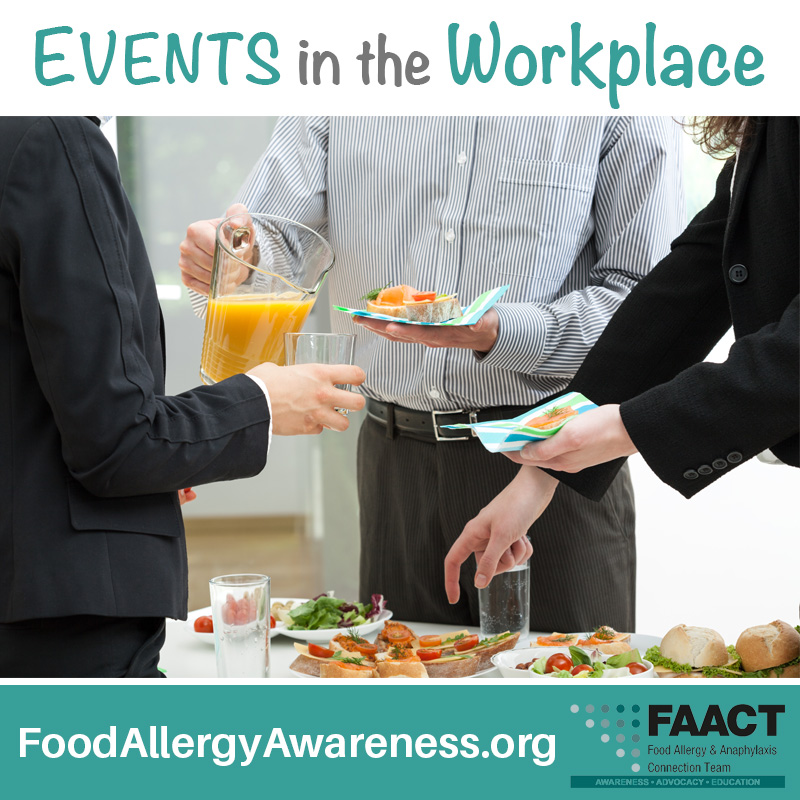
Events in the Workplace
When you add up the hours, an individual spends more time at work than at home or out and about. We are surrounded by co-workers that become our work family. They eat two meals out of the three a day with you, and you often times share your morning and afternoon snack time together. Although many meals are spent in the office, there are times when they aren’t. This includes office parties, retreats, holiday events, the list goes on. So how do you make sure that you can enjoy the event and the food?
Here are some tips on how to make sure the event is safe for you:
- Do your research and suggest the top restaurants in the area that are safe for you (i.e. delivery, dine in, take out, etc.)
- If your suggestions aren’t considered (which they may not be), once a place is chosen, consider calling to speak to the manager and head chef.
- Reiterate your food allergies once you arrive in person.
- Once the food arrives, if it looks suspicious, just don’t eat it, otherwise enjoy!
Retreats and/or social work events are surrounded by food; especially around the holidays. It is important that amongst the fun of a celebration, you don’t forget about your health and your safety! Some situations and conversations may feel uncomfortable, especially when you are conversing with a superior, but it is important that no matter what level of seniority doesn’t understand, you are clear and firm in the importance of your food allergy.
Download FAACT's Events in the Workplace.
Food allergies affect as many as 32 million Americans, including 26 million adults.
Be “Empowered” with these TEAL Tactics on how to start and maintain the discussion of food allergies in the workplace!
Follow FAACT Adults with Food Allergies Facebook Page
Click here to learn more more about managing food allergies as an adult.
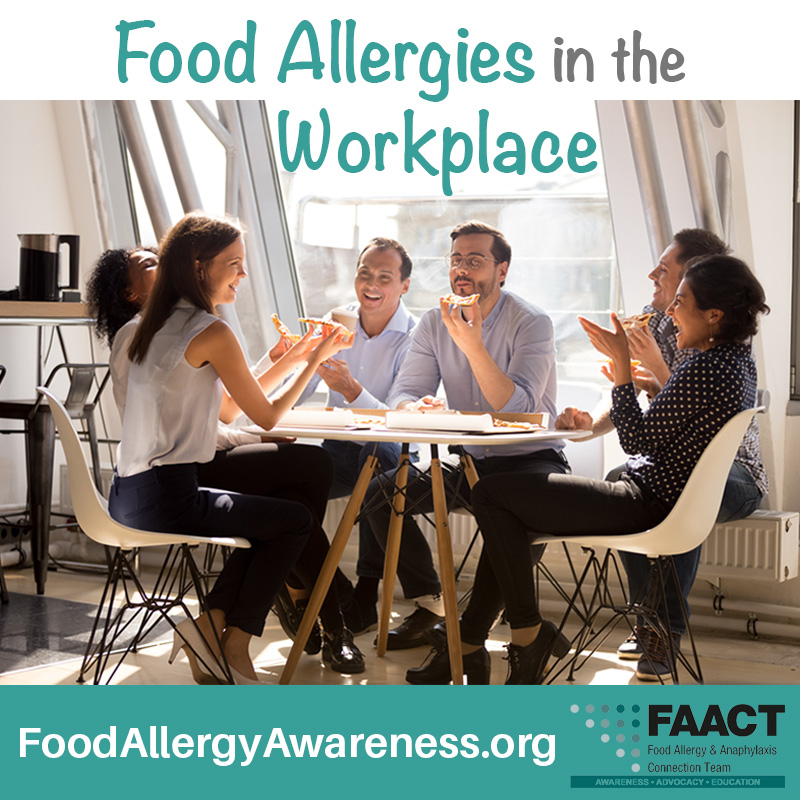
Empowered Adults in the Workplace:
Managing Food Allergies in the Work Environment
TEAL Tactics on how to keep the conversation crucial and casual:
- Discuss your food allergies and the seriousness during an orientation period. Or sooner if possible. (i.e. as you introduce yourself in the office, orientation, business meetings).
- Show your coworkers where your epinephrine auto-injectors are located and how to administer it in case of an emergency.
- Identify at least three, trustworthy co-workers that will administer epinephrine in case of emergency.
- Confirm what your internal procedures are if you have an anaphylactic reaction and what to do.
- Explain your Allergy & Anaphylaxis Emergency Plan in detail and ask if they have any questions.
- Explain what your symptoms may look like to your co-workers.
- Make sure you explain the importance of cross-contact (i.e. Keurig machine “hazelnut k-cups”, microwave, kitchen utensils/sponge, etc.).
- If there is miscommunication and an incident occurs, take immediate action and address the concern; reiterate the importance of knowledge and the circumstances. Offer to re-educate your team on food allergies and how to keep you safe.
- Offer to bring in snacks or baked goods for office parties so that you can enjoy them as well!
- Feel free to share your allergen-friendly treats with a co-worker who’s having a craving!
- Consider calling the restaurant when ordering take-out food or if something is being catered. Consider speaking directly to the chef.
- Respectfully say “no thank you, I have food allergies, but thank you for thinking of me” when needed.
- Use caution when food is unlabeled. No label = do not eat it.
- Always keep safe food available, so you never feel left out.
TEAL Tactics when sharing a communal space with co-workers:
- If you’ve encountered resistance, consult with your direct report about what is occurring after you’ve had the conversation about keeping a safe work environment.
- Offer to lead a department meeting about kitchen etiquette where all are free to vent/share their opinions. This allows you the opportunity to discuss cross-contact and keeping the common area clean and free-from allergens.
- Reiterate the importance of cross-contact and how to be cautious of washing items that may contain your allergen.
- Keep a designated soap, sponge, Keurig, etc. and label them “allergy-free – please respect”.
- Make a dedicated shelf in the fridge an “allergy-free” shelf for those with food allergies.
- Always label your food and drinks with your name to avoid cross-contact.
- Request a regular cleaning of your office space, bring cleaning wipes if you’re uncomfortable.
- If the miscommunication continues, contact your Human Resources Department for more information about your civil rights under the Americans with Disabilities Act (ADA).
Download FAACT's Managing Food Allergies in the Work Environment.
Food allergies affect as many as 32 million Americans, including 26 million adults.
Be “Empowered” with these TEAL Tactics on how to start and maintain the discussion of food allergies in the workplace!
Follow FAACT Adults with Food Allergies Facebook Page
Click here to learn more about managing food allergies as an adult.
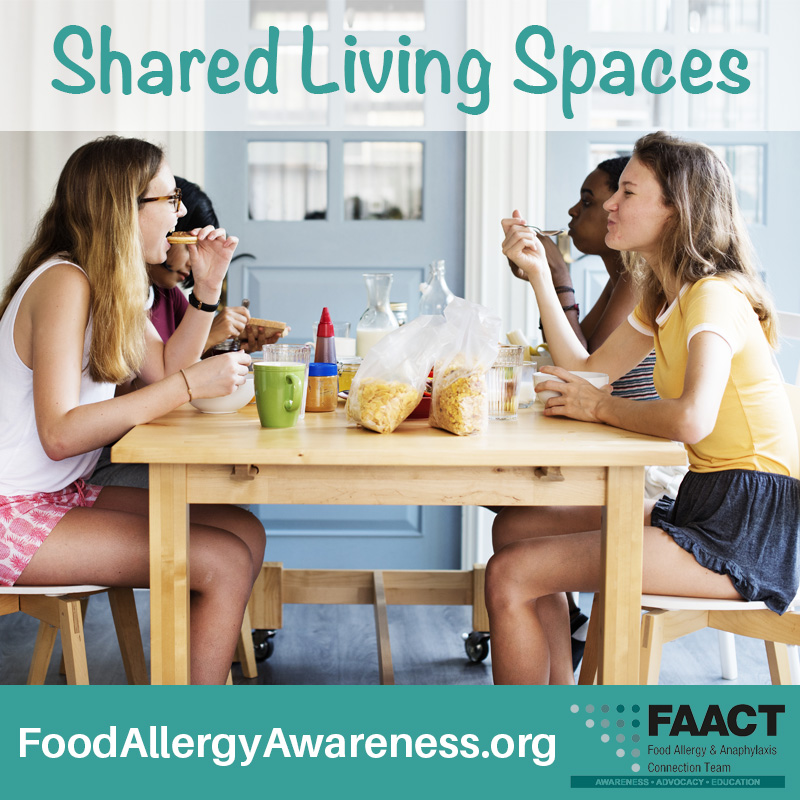
Empowered Adults in Shared Living Spaces
Teal Tactics to ensuring a safe shared space:
- Choose a roommate that will respect your allergies and advocate to keep you safe.
- Choose a roommate that will take precautions if/when eating your allergens in the home and respect your safe space in the home.
- Use caution when sharing food or drinks in case your roommate/partner/significant other has eaten your allergen. It is best practice to not share utensils or water bottles/glasses.
- Keep your own designated allergy-free kitchen items separate from your roommates, such as a toaster, dish sponge, etc to minimize the risk of cross-contact.
- Make a dedicated shelf and drawer in the fridge an “allergy-free” shelf for those with food allergies.
- If your roommate brings something home that contains your allergen, make sure it is labeled to avoid accidental consumption.
- If your allergen is in your home, ensure that it is contained within a secure container and clearly labeled.
- If your roommate does bring home alcohol that contains your allergen, make sure it is labeled properly and stored in a designated/safe area.
- Keep a clean, safe space; use appropriate cleaning products if eating or cooking with your allergen.
- If your allergen IS consumed by your roommate, ensure your roommate washes his/her hands properly with soap and water.
- Request advanced notice if your roommate is cooking with your allergen, to avoid accidental exposure.
- Keep a designated kitchen cabinet for safe foods and drinks.
- Communicate and educate your roommate (their family & friends) about your food allergy on a regular basis.
- If outside food is brought in, and it contains your allergen, respectfully decline OR make sure it is properly labeled with a dedicated serving utensil.
- Ensure that your roommate knows where your epinephrine auto-injectors are and how to use it in case of emergency.
- Ensure that your roommate knows what your Allergy & Anaphylaxis Emergency Plan is and how to follow it.
- Suggest going grocery shopping together – show your roommate how to read labels so you can ensure safe food coming into your home.
- Teach your roommate how to cook for someone with food allergies and how to avoid cross-contact.
- Frequent cleaning of common spaces and items is necessary to avoid a contact allergic reaction (i.e. remote control, refrigerator handle, chairs).
- Thank your roommate for his/her compassion, empathy, understanding, and trust!
Download FAACT's Empowered Adults in Shared Living Spaces.
Food allergies affect as many as 32 million Americans, including 26 million adults.
Be “Empowered” with these Teal Tactics on how to start and maintain the discussion of food allergies in shared living spaces!
Follow FAACT Adults with Food Allergies Facebook Page
Click here to learn more about managing food allergies as an adult.
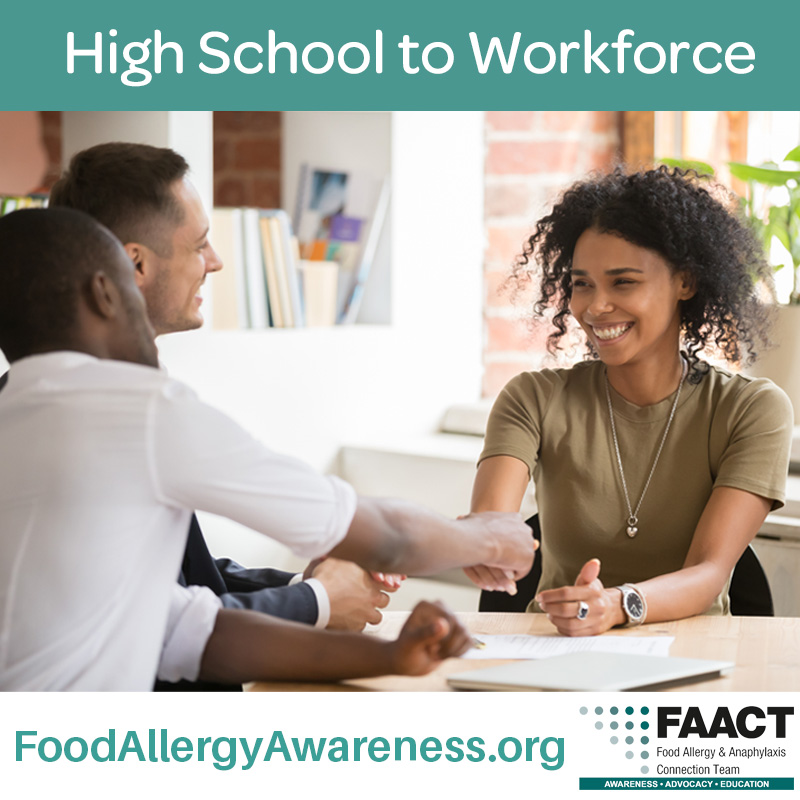
High School to Workforce
What an exciting time! You have graduated high school and now are looking for a job. Or maybe you have already secured a post-graduation position. Whatever the case, it is time for you to take over as your food allergy advocate. Below you will find things you need to consider when heading into the workforce as an adult.
If you check off anything on this page, this is the one thing that is a MUST-DO:
- Always carry two epinephrine auto-injectors on your person! No excuses!
Even if you need to strap them to your ankle or carry them in a cross-body bag, you must ALWAYS carry your rescue medications with you, whether or not you plan to eat or drink something. They are called life-saving medications for a good reason.
Download FAACT's High School to Workforce Checklist.
Housing
Decide what is right for you. Some young adults prefer to continue to live with their parents after high school graduation (a great way to save money!) while others prefer to strike off on their own and get an apartment or house. If you plan to share an apartment or house with someone, you will have more to consider regarding safety.
Before you start the process of interviewing roommates, it’s important to talk to your board-certified allergist about whether you need allergens to be kept completely out of the home or if it’s okay for your roommate to have them, as long as foods are clearly labeled or your roommate takes other precautions to keep allergens separate from your food and personal items.
Topics to consider:
- Are roommates willing to not keep allergens in the house or keep them in their own room?
- Will your roommates agree not to share your cookware?
- How will you handle appliances? Is it safe for you to share a refrigerator and microwave with someone who may be preparing foods with allergens?
- Is the apartment/house smoke-free if you have asthma?
- Will your roommates learn to use an epinephrine auto-injector to help you in an emergency?
- Will they make sure their friends don’t bring allergens into the house when you are not there?
- Will they agree to not share silverware/mugs with you (or be willing to be diligent about cleaning shared items)?
- Is there a hospital within a reasonable driving distance from where you are going to live?
Read FAACT's Shared Living Spaces section and the Shopping, Cooking, and Eating with Food Allergies section for much more detail on issues to consider with roommates and food allergies.
Workplace
- Alert your immediate supervisor of your food allergies upon hire.
- Alert your coworkers as well.
- Establish a game plan for shared spaces. At work, your colleagues may eat at their desk or in a shared cafeteria/break room.
- Will your coworkers agree not to eat your allergen around you? Can a safe eating place be established at your place of work?
- Check out FAACT’s Adults with Food Allergies section for tips on managing food allergies in the workplace, events within the workplace, socializing, and more.
Dining
- Learn about the local eateries from which your colleagues order lunch.
- A lot of workplaces have certain days of the week they order out lunch as a team. You will want to check ahead to see if this place would be safe for you.
- Find safe restaurants in the area that you can suggest to the group!
If you’re going to work for a large company or government agency, there might be a cafeteria onsite.
- Is there an established protocol for managing food allergies at the cafeteria? If so, review the policies and ask for details:
- How will you request and receive safe meals?
- Confirm your responsibility to secure safe meals.
- Confirm with the cafeteria’s responsibility for serving safe meals.
- Have food service staff received advanced food allergen management training from accredited sources, such as AllerTrain™? NOTE: AllerTrain has partnered with FAACT to offer expert food allergy training and food service protocols. Does the food service have a policy in place for ordering allergen-safe ingredients? Are they able to read labels or confirm ingredient cross-contact risk from the manufacturer?
- Will these practices meet your needs? If not, plan on packing safe foods to eat at work.
Socializing
As you make friends at work, the opportunity to eat a meal together, hang out after work, or go to parties may arise. New friends WANT to know about your food allergies, where rescue meds are stored, and what to do in case of an emergency. Please do not assume that you are a burden; it is the opposite of what you might think.
- Research local restaurants that are safe for you to enjoy with new friends.
- Be ready to let new friends know about your food allergy, where you carry epinephrine auto-injectors, and where you keep your Allergy & Anaphylaxis Emergency Plan (emergency plans should always be with your epinephrine auto-injectors).
- Get comfortable and ready to explain cross-contact, how you stay safe, signs you are having an allergic reaction, and what you need during an allergic reaction.
- Do you have a “sign” if you need epinephrine? (You might be too far away for someone to hear you clearly, and anaphylaxis can make it difficult to speak.) Learn FAACT’s Fist to Thigh “Sign” and share it with your friends!
Civil Rights and Legal Considerations
- The U.S. Department of Justice has determined that food allergies are a disability that may be accommodated by workplaces.
- If you had a 504 plan in high school, it can support the need for accommodations in subsequent areas of your life, such as the workplace.
- If you need assistance, contact FAACT's Vice President of Civil Rights Advocacy at Amelia.Smith@FoodAllergyAwareness.org.
Healthcare
- Ask your parents/caregivers if you will remain on their health insurance or accept your work’s plan if they offer one. Get an up-to-date insurance card.
- TIP: Keep a front and back photo of the insurance card on your phone.
- Locate a local board-certified allergist if you moved to a new area.
- Ask for recommendations from your current allergist and ask your parents or caregiver to help you find a local provider.
- If you participate in OIT, SLIT, or other food allergy treatments that need to continue, speak to your doctor ASAP about how treatment will continue if you have to change allergist offices.
- A new allergist will likely want to review your current allergist’s records so they are fully in the know about your medical history. Once you find a new allergist, ask them about the process for sharing medical records with them.
- If you are staying in your current area, as an adult, you are now the main contact for your appointments and treatment needs. Get ready!
- If you changed insurance plans, you’ll need to provide that new insurance information to your doctors and pharmacy.
Emergency Services and Medical Management
Managing food allergies includes two critical steps: reducing your risk by taking steps each day to prevent an allergic reaction and being ready to take swift action if a reaction occurs.
- Learn how medical emergencies are handled at your company/job site.
- Does someone call 911 or is there security/medical assistance onsite who should be called first?
- How long does it take to get help?
- Does your office stock emergency epinephrine? If so, who is authorized to administer it?
- Who will assist you if you experience an allergic reaction at work?
- Is emergency medical care close to the workplace? Are there local hospitals with functioning Emergency Departments?
- Medical Identification jewelry speaks for you in the event you are not able to communicate. Emergency responders are trained to look for medical IDs. Various ID products offer contact data that helps EMS learn about your health, gain access to your medical information, and contact your loved ones.
- Although wearing a medical bracelet or necklace may not have crossed your mind, you will be grateful for the support in the event of a medical emergency.
- There are many varieties and styles available. Medic Alert has partnered with FAACT to offer a 20% discount for new subscriptions. Use code FAACT20.
Technology
Many young people enjoy using apps to help them manage their lives. Families rely on apps to help them stay connected and manage health conditions, including food allergies. Explore apps to help you keep track of epinephrine expiration dates, manage your health, or find potentially safe eateries.
NOTE: FAACT does not endorse these apps, but we are sharing them to provide you with examples of what some FAACT families are using right now.
- AllerTrain™/FAACT: Map of colleges/universities food service departments that have been trained.
- MenuTrinfo® Kitchens with Confidence™ Program: which certifies food service locations that have been assessed through rigorous audits on methods, standards, policies, and understanding to serve persons with special dietary needs, specifically food allergies. A map of certified locations available on the AllerTrain™ website is a useful tool for students going to college with food allergies.
- Allergy Force: Food Allergy Management
- Allergy Eats: Food Allergy Friendly Restaurant Guide
- Headspace: Meditation and Sleep App (family subscription)
- AirNow: Air Quality App
- Life360: Family Safety App
- American Automobile Association (AAA): Mobile Roadside Assistance Service and Travel Discounts
Managing Stress
- Make time for yourself.
- Making money can be exciting! As a new employee, you can get lost in the desire to make as much money as possible by taking on more hours (if you are paid hourly) or feel like you need to impress the boss by working a lot of extra hours.
- Make sure you are still making time to do what makes you happy (whatever that is!). Do at least one thing that you love every day, whether it’s reading a book, going for a run, watching cat videos, or something else entirely.
- Keep an agenda.
- Agendas are not just for high school. Keeping a planner, whether it is digital or physical, will help you stay on track in terms of appointments and other life commitments.
- Create a work/life balance.
- Being committed to work is important. Arriving on time and accomplishing your tasks will make you successful. But balancing the right amount of work with your social life, family life, and taking care of yourself will keep you happy, healthy, and able to do your best work.
- Make sure the people you regularly spend time with know about your food allergies in detail, especially your immediate boss and co-workers, including where you carry auto-injectable epinephrine and if you’re wearing a medical ID tag.
- Consider speaking with a therapist about skills for managing stress and anxiety at work. These are normal feelings, and there are great tools available that will help you your entire life!
- Visit FAACT's Behavioral Health Resource Center for more tips on managing stress and maintaining mental health.
Working and thinking about college, as well? Visit FAACT's College Resource Center for more resources.
Confidence is key! Own it!
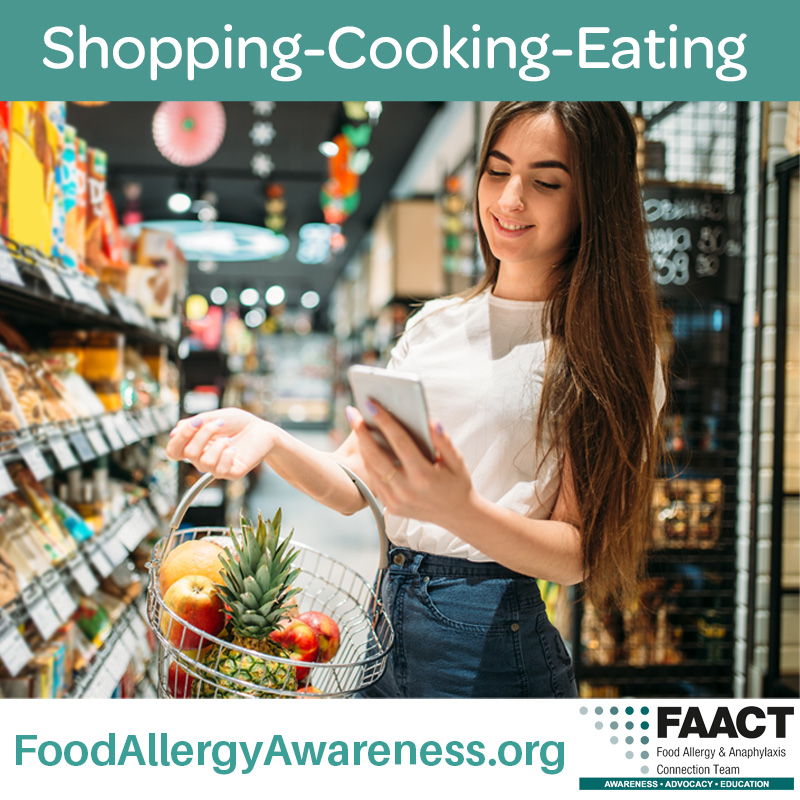
Shopping, Cooking, and Eating with Food Allergies
Moving or living on your own can be exciting – and a little nerve-racking as food allergy responsibilities shift and put you in control of cooking and entertaining. Let us help you get comfortable with your new kitchen by offering a few tips.
Shopping
- Learn how to read product labels, including “hidden” terms used for certain allergens.
- You will generally want to avoid the bulk foods aisle and salad or hot food bars where cross-contact can occur.
- No label, do not purchase or eat!
- Get comfortable calling a manufacturer to confirm ingredients and cross-contact risk with your allergen, particularly if foods have generic ingredient lists such as “spices.”
- Understand that labels are not complete. Precautionary labeling – such as “may contain,” “made on shared lines,” or “made in the same facility as” – are VOLUNTARY. A manufacturer does not have to label for potential allergen risk if allergens are not an actual ingredient in that product.
- Manufacturers are only required to label packaged food products for the top eight allergens: peanut, tree nut, wheat, soy, egg, milk, fish, shellfish, and sesame.
- As of January 1, 2023, sesame was added as the top 9th allergen and is required to be plainly labeled on all packaged foods.
- U.S. Food and Drug Administration rules on allergen labeling do not include alcohol products or personal care products, both of which can contain common food allergens.
- Be wary of packaged foods sold at farmer’s markets, local shops, or other small producers who may use shared kitchens to create small-batch products. Ask about allergens in the foods as well as potential cross-contact. Fresh product is a safer purchase at a farmer’s market than something like baked goods.
Cooking
- Confirm your house rules for allergens: Are they allowed in the house? In the kitchen? How will you keep your food and ingredients separate?
- Consider maintaining an allergen-free shelf in the refrigerator and pantry if that is adequate for your needs.
- Don’t be afraid to ask for what you need, but be up front about it before you enter into a shared housing situation with friends. If your friend has a life-long love of PB&Js and you need them to keep peanut butter out of the house, that’s something that should be discussed before you sign a lease together.
- Consider how you will manage microwaves, toasters, and other shared appliances. Will these be exposed to roommates’ foods that contain allergens? Will you need to have a personal toaster, microwave, and other appliances to prevent cross-contact?
- Visit FAACT’s Pinterest Page to find Allergy-Friendly Recipes, Cultural Allergy Friendly Recipes, and the Kid’s with Food Allergies Safe Eats Allergen-Friendly Recipe database.
- Always do your research for safe ingredients, read labels, and call manufacturers if needed.
Eating
- If someone else is cooking for you, ask about food preparation and cross-contact. Ask to read the ingredient labels for every item used in meal preparation (including condiments and sauces).
- Make sure you feel comfortable that the person cooking for you can keep you safe. If not, bring your own food or a dish to share, and bring your own serving utensils.
- If it’s not inconvenient for your host, one approach to consider is helping with food preparation so you can read labels and prevent cross-contact as you go. (It can also be fun to cook together!)
- Carry allergen-safe energy bars, alternate nut or seed butters and crackers, and other satiating foods when you are away from home. Keep them stocked in your backpack/purse or other bag that you use when you leave the house.
- Keep a list of allergen-friendly restaurants and eateries handy for suggestions when a group of friends wants to eat out.
- When in doubt, don’t eat it!
- Even if you’re not planning to actually eat at a friend’s house or a restaurant, you can still be exposed to allergens. Be sure to carry two epinephrine auto-injectors and your Allergy & Anaphylaxis Emergency Plan when you leave the house.
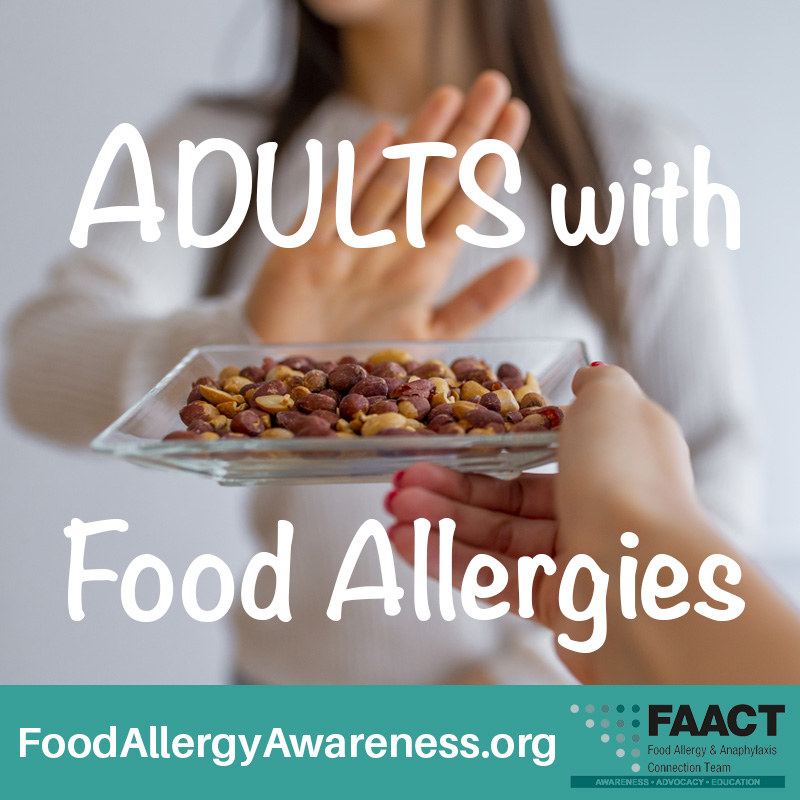
Food allergies affect as many as 32 million Americans, including 26 million adults and 5.6 million children.
- Food allergy affects approximately 7.6 percent(2) of children and 10.8 percent(1) of adults in the United States.
The Centers for Disease Control and Prevention (CDC) report that although food allergy is more prevalent in children(3) than adults, many affected children can “outgrow” food allergies with age. In adults, however, food allergies tend to be life-long. Children with peanut, tree nut, seed, fish, or shellfish allergies generally maintain these allergies for life, and they comprise a large proportion of food-allergic adults.
A food allergy is an immune-mediated response to a food protein in which the body identifies certain foods as harmful and makes a specific antibody (IgE) against that food. In certain cases, other immune cells are involved. Food allergy is not the same as other adverse reactions that do not involve the immune system, such as:
- Scombroid food poisoning from spoiled fish, which mimics an allergic reaction.
- Pharmacological reactions to chemicals added to foods or that foods contain naturally (e.g., caffeine, tyramine, serotonin, alcohol, MSG) that cause symptoms such as cough, nasal stuffiness, headache, increased heart rate, or flushing but do not involve the immune system.
- Reactions without a defined cause. For example, sulfites are associated with cough and upper respiratory symptoms in some individuals.
These non-immune-mediated reactions may be referred to as an “allergy,” but “allergy” carries a very specific definition.
Nine foods account for 90 percent of serious allergic reactions:
- Egg
- Fish
- Milk
- Peanut
- Shellfish (shrimp, crayfish, lobster, crab, clam, scallop, mussels)
- Soy
- Tree nuts (walnuts, almonds, pecans, pistachios, cashews, hazelnuts, macadamia nuts, etc.)
- Wheat
- Sesame
While more than 160 foods can cause allergic reactions in people with food allergies, the law identifies the eight most common allergenic foods. (4)
In infants and young children, common food allergens include:
-
Cow’s milk, egg, peanut, tree nuts, soybeans, and wheat.
In adults, common food allergens include:
-
Shellfish (both crustaceans and mollusks), peanuts, tree nuts, fish, and fruits and vegetables. (Fruits and vegetables frequently cause Oral Allergy Syndrome, which is explained in more detail below.)
With dietary restrictions and preferences on the rise, the term “allergy” is often used loosely. For example, a person with gluten intolerance – also a serious issue – might say she is “allergic” to gluten even though it is not a true “allergy.” People may have dietary restrictions without having a true food allergy, such as eating vegan or a diet restricted due to religious beliefs.
However, if you are allergic to a particular food, you may experience any of the following symptoms:
- Itchy mouth
- Swelling of the lips, tongue, and throat
- Vomiting, diarrhea, abdominal cramps and pain
- Hives (welts), itchy rashes
- Persistent eczema
- Tightening of the throat, trouble breathing, wheezing, coughing
- Sneezing, hoarseness, nasal congestion
- Drop in blood pressure, fainting, weak pulse
- A severe allergic reaction known as anaphylaxis.
It’s important to know the difference between food allergy and food intolerance or other adverse reactions to food and to seek a proper diagnosis and treatment from your doctor. If you or your doctor suspect a food allergy, make an appointment with a board-certified allergist for further testing. If a food allergy is confirmed, it is extremely important to continue treatment as recommended by your physician and to always carry prescribed medications.
More information about food allergies and food intolerances can be found by visiting our food allergy basics Web page.
Anaphylaxis
Anaphylaxis is a serious allergic reaction that comes on quickly and has the potential to become life-threatening. It includes a wide range of signs and symptoms that can occur alone or in combination after exposure to an allergen.
Anaphylaxis requires immediate medical treatment, including an injection of epinephrine and a visit to the emergency room. Anaphylaxis can be fatal if not treated promptly.
Sometimes a second round (or “phase”) of allergic reactions can occur after the initial anaphylactic reaction. This is called “biphasic anaphylaxis” A second reaction may happen as early as an hour after the first reaction or as long as 72 hours later (the average is 10 hours later) and can be less severe, as severe, or even more severe than the initial reaction. Up to 20 percent of people who have symptoms of anaphylaxis experience a second reaction related to the first – without any additional exposure to the allergen that caused the first allergic reaction.
Due to the risk of a second reaction, some physicians recommend observation in a hospital for up to 24 hours after the initial symptoms of anaphylaxis have been treated.
Learn more now about the signs and symptoms and treatment and management of anaphylaxis.
Oral Allergy Syndrome
Allergy to fruits and vegetables are the most common food allergies reported by adults and typically develop later in life. This type of allergy is called Oral Allergy Syndrome (OAS) or Pollen-Food Allergy Syndrome (PFAS). The reaction occurs because the proteins in some fruits and vegetables are similar to the proteins in pollen.
In most cases of OAS, symptoms only develop when eating the raw, uncooked food. The most common signs and symptoms are itching, tingling, redness, blisters, and swelling of the lips, mouth, or throat.
Food Allergy Management
Adults with food allergies often find themselves in situations that make managing food allergies difficult. This may include dinner meetings, travel, and even work environments. For adults who have recently developed an allergy, learning to navigate and adapt to this change in lifestyle can prove difficult, frustrating, and even stressful at times.
Adults commonly state they are good about “avoiding” their allergen. However, this is not adequate in managing food allergies. Due to the high-risk situations adults often find themselves placed in, it’s extremely important to continue treatment with a board-certified allergist, keep prescribed medications close at hand at all times in case of unintended exposure to allergens, and always read food labels.
There are many resources on our Web site to help adults learn how to navigate food allergies successfully. Through the support, education, and tools provided within this site and FAACT’s electronic newsletters for patrons, adults with food allergies can continue to lead fulfilling and productive lives!
Resources
- Food Allergy Basics
- Anaphylaxis
- Food Labels
- Related Conditions
- Dining Out
- Find a Support Group
- Follow FAACT Adults with Food Allergies Facebook Page
References
https://www.fda.gov/food/buy-store-serve-safe-food/food-allergies-what-you-need-know